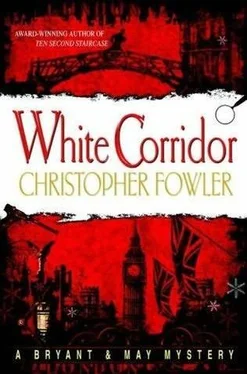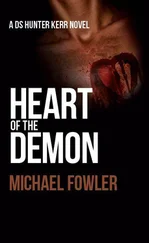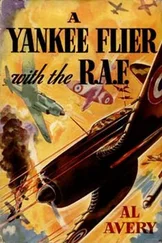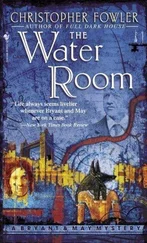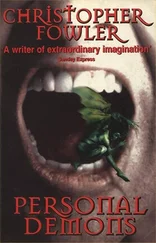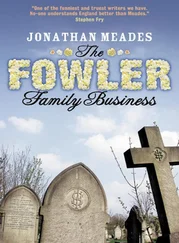“Penknife or scissor wound,” said Bryant. “Interesting.”
The dead man appeared to be in his mid-forties but was probably younger. He wore the blue overalls provided by his company. A badge read Bentick’s - We Deliver. ‘Dreadful skin, looks like he hasn’t had a drink of water in years,“ sniffed Bryant. ”Subsisted on a diet of cigarettes, coffee and bad motorway food.“
May had forgotten to pack the Valiant, his trusted old cinema torch, but he was enough of a pessimist to still carry a pencil flashlight in his jacket. He shone it into the pale wash of light and picked up blood spots on the steering wheel, a streak across the base of the windscreen, a still-wet smear on the dashboard. “No struggle here,” he told Bryant, “just surprise and collapse. He was attacked by someone who posed no threat. Someone he probably thought was a friend.”
“The passenger. A hitchhiker, you think? He fled the scene pretty quickly. Blood on the passenger door handle. He won’t last long out there in the blizzard.”
“Not unless he’s climbed into one of the other stranded vehicles. Someone else could be in danger. We need to get a description of him somehow. I can’t get much from the crime scene in these conditions.”
Bryant looked up at the windscreen. “I don’t understand.
This window is snowed over. How could your witness have seen the driver through the glass?“
“You don’t think that’s our man?” asked May. “Why on earth would he have come to us?”
“I don’t think he faked looking that terrified, John. We can’t trust what we see. Snow and wind can do anything to this landscape.”
“Okay, let’s get back to the van. You’re starting to turn blue.”
They trudged back through the white valley of stranded cars. The rear door of the van stood wide, and without its heater running the Bedford had started to ice solid. Their witness was nowhere to be found. May took his mobile from the dashboard and got connected to the Plymouth constabulary.
“They can’t get anyone to the area,” Bryant was informed. “The Highways Agency has stopped all traffic because the winds are expected to stay at gale force tonight. They’re saying that as long as no-one’s in imminent danger we should just sit tight. They’ve got GPS and mobile tracking equipment, so they have a rough idea of how many people are stranded here. They’re going to try and drop in emergency supplies the moment the wind lets up.”
“A snowbound murderer,” said Bryant with relish. “It’s almost too good to be true. We know he’s stranded here with us, but what is he doing?”
Outside in the white corridor of the arterial road, twenty-seven drivers and passengers were marooned in their vehicles, spread over half a mile of inundated road. Johann moved among them, silent and trackless, prepared to pass from one warm haven to the next, desperately searching for a mother and her son.
THE ANCIENT CORONER
Dissecting the body of his former colleague was not only unethical, but a profoundly depressing experience. Kershaw pushed a blond lick from his eyes and set aside the scalpel, flexing his slender fingers. He looked down at the splayed body on the steel table. Even though the temperature in the converted gymnasium had fallen to around ten degrees centigrade, he was sweating. Finch would never have lived to see much of his retirement; the parts of his arteries that had not hardened were bubbled with developing embolisms. He must have suffered painful side effects, certainly enough to encourage the use of powerful painkillers. All the talk about finally being able to relax in his fishing hut in Hastings had been bravado, nothing more. The pathologist had known he was dying.
The thought recurred to Kershaw: Might he have arranged his own demise? If so, to what end? Bryant would doubtless suggest he had done it to annoy everyone.
He looked down at the old tyrant, laid out on the very dissecting table he had used for so much of his working life.
Kershaw had once read that the body weighed infinitesimally less after the spirit had departed. The ancient coroner’s life force had clearly evaporated now, for he had been reduced to a papery dry shell, the cocoon husk of a departed creature. Facially, he resembled an etiolated Boris Karloff. His arms were traversed with a tangle of partially collapsed veins and blossoms of broken blood vessels, but there were no recent marks of violence other than the ones on his neck and chest, nothing else to suggest that a struggle had taken place.
Finch had admitted his attacker in good faith, thought Kershaw, only to be surprised while his defences were down. If it wasn’t someone from the unit, it had to be Mills. Finch must have trusted the boy enough to turn away from him. The old man had been married, but never spoke of his emotional attachments. Was it possible he had a secret; could he have found the seventeen-year-old attractive, and acted inappropriately? He tried to recall any rumours he had heard about the pathologist, but came up with nothing untoward.
Kershaw rang the detective sergeant. “Are you still with Mills?” he asked. “Think he’s on drugs?”
“Absolutely not. Normal pupil dilation, clear speech, fast reactions, completely normal as far as I can tell. At least he’s talking now.”
“Any idea how tall he is?”
“About one hundred sixty-five centimetres,” Longbright replied. “Why?”
“Five five-he’s too short, Janice. Apart from the disparity between his visit and the time of death, the bruising angle is wrong. I don’t think he killed Finch. You didn’t find a small brown plastic bottle on him?”
“Nothing in his pockets, but we know he took Finch’s notes, even though he won’t admit it. They may still be on site. He’s wearing her neck chain, says she gave it to him. A piece of cheap gold plate, but there’s a name engraved on it, Lilith Starr. Sounds made up. Mills says she kept a squat on the Crowndale Estate, where he lives.”
“You think he’s just some opportunist thief who saw a girl he knew, followed the ambulance and plundered her dead body? Doesn’t that seem a little odd to you?”
“Come on, Giles, there are crime victims in Camden Town who are stripped before they hit the pavement.”
There was a knock at the door. “Have you finished?” asked Banbury, averting his eyes. It was bad enough that Bryant had asked him to photograph the deceased girl’s neck, without him having to see the dead face of a former colleague.
“Pretty much. You can come in now.” Kershaw pulled a Mylar tarp over the body and clipped it in place. “I tested for naltrexone and morphine. There’s none in his body, but he must have been suffering periodic bouts of pain. He would only have lasted a matter of months.”
“You think he knew that?”
“He should have done-he was a biologist, although they’re notoriously neglectful about their own workings.”
“Can I take another look around?”
“Knock yourself out,” said Kershaw, rubbing his eyes. “It’s gone eleven. I’m just about done here.” He looked about the sparse room. “I don’t know-there’s some trace evidence we’ve missed-‘
“There’s always something more.” Banbury peered out from behind a locker. “You can’t be expected to pick up on everything.”
“That was Finch’s main criticism of me. He said I rushed things, missed obvious opportunities. I don’t want to make that mistake now. This is my chance to put things right.”
The empty space on the drug shelves nagged at him. He had seen the bottles lined up on them often enough, knew how much of a stickler the old pathologist had been about them. There could be other explanations; he might have accidentally broken it, or forgotten to get the naltrexone replaced after use.
Читать дальше
